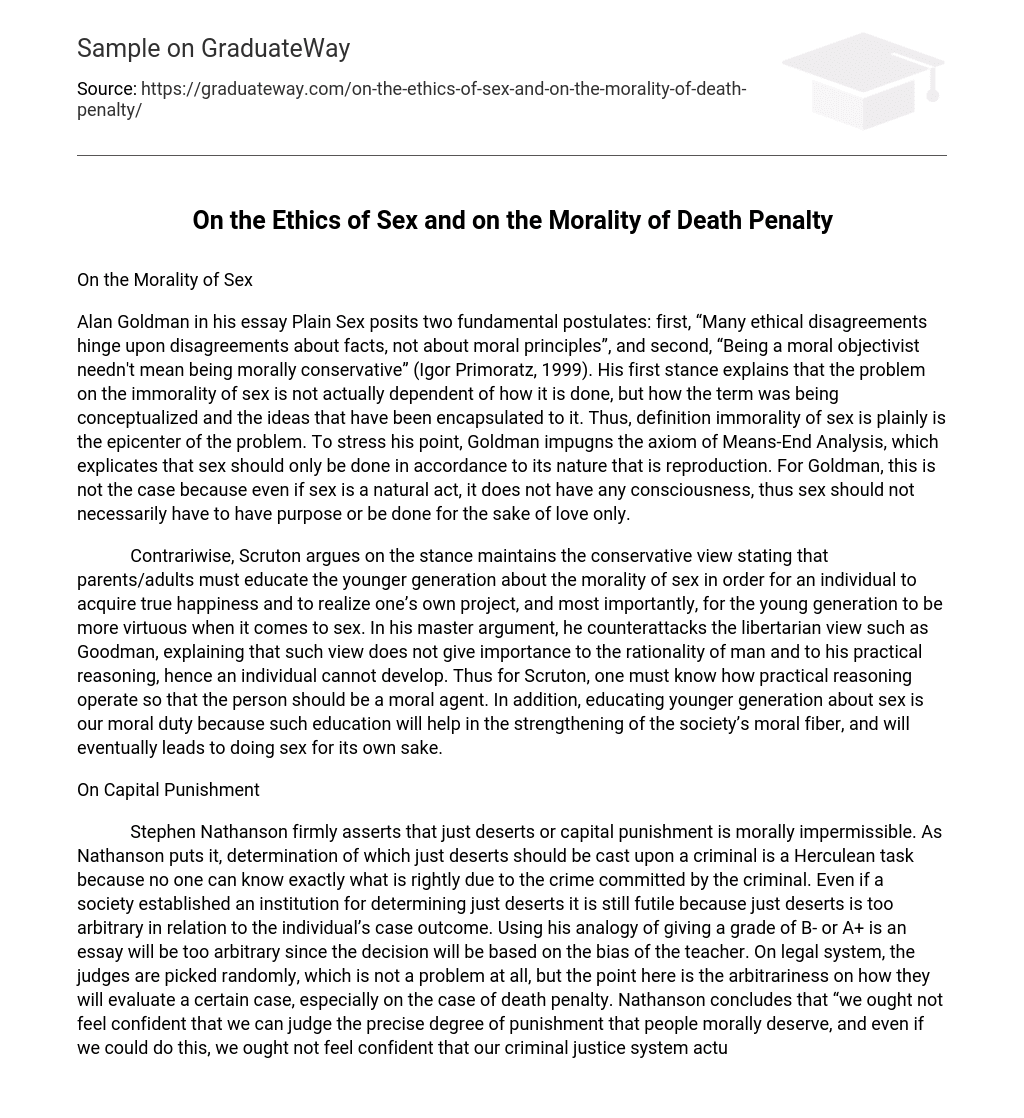Alan Goldman in his essay Plain Sex posits two fundamental postulates: first, “Many ethical disagreements hinge upon disagreements about facts, not about moral principles”, and second, “Being a moral objectivist needn’t mean being morally conservative”. His first stance explains that the problem on the immorality of sex is not actually dependent of how it is done, but how the term was being conceptualized and the ideas that have been encapsulated to it. Thus, definition immorality of sex is plainly is the epicenter of the problem. To stress his point, Goldman impugns the axiom of Means-End Analysis, which explicates that sex should only be done in accordance to its nature that is reproduction. For Goldman, this is not the case because even if sex is a natural act, it does not have any consciousness, thus sex should not necessarily have to have purpose or be done for the sake of love only.
Contrariwise, Scruton argues on the stance maintains the conservative view stating that parents/adults must educate the younger generation about the morality of sex in order for an individual to acquire true happiness and to realize one’s own project, and most importantly, for the young generation to be more virtuous when it comes to sex. In his master argument, he counterattacks the libertarian view such as Goodman, explaining that such view does not give importance to the rationality of man and to his practical reasoning, hence an individual cannot develop. Thus for Scruton, one must know how practical reasoning operate so that the person should be a moral agent. In addition, educating younger generation about sex is our moral duty because such education will help in the strengthening of the society’s moral fiber, and will eventually leads to doing sex for its own sake.
On Capital Punishment
Stephen Nathanson firmly asserts that just deserts or capital punishment is morally impermissible. As Nathanson puts it, determination of which just deserts should be cast upon a criminal is a Herculean task because no one can know exactly what is rightly due to the crime committed by the criminal. Even if a society established an institution for determining just deserts it is still futile because just deserts is too arbitrary in relation to the individual’s case outcome. Using his analogy of giving a grade of B- or A+ is an essay will be too arbitrary since the decision will be based on the bias of the teacher. On legal system, the judges are picked randomly, which is not a problem at all, but the point here is the arbitrariness on how they will evaluate a certain case, especially on the case of death penalty. Nathanson concludes that “we ought not feel confident that we can judge the precise degree of punishment that people morally deserve, and even if we could do this, we ought not feel confident that our criminal justice system actually does so”.
Conversely, Jeffrey Reiman sees the validity of espousing death penalty but on a certain degree only. First, the arbitrariness of death penalty’s harshness is a problem because some criminals may get what they deserve but others may be penalized less or more harshly than what they should be getting. Second, death penalty is a good means of deterring criminals but it does not ensure our society on the deterrence future criminals. Third, prohibition of death penalty may increase crime rate but it can reduce cruelty percentage and may either result to chaos due to tolerance or human civilization. And lastly, death penalty is definitely a just punishment to specific forms of crime, but its arbitrary nature endangers every individual because of its discriminatory execution. Hence, death penalty will be effectively just if such arbitrariness is defined.
Reference:
Goodman, A. (2005). Plain Sex. In I. Primoratz (Ed.), Ethics and Sex (1st ed.): Routledge.
Leighton, P., & Reiman, J. (2000). Criminal Justice Ethics (1st ed.): Prentice Hall.
Nathanson, S. (2006). Is the Death Penalty What Murderers Deserve? In J. M. Pollock (Ed.), Ethical Dilemmas and Decisions in Criminal Justice (Ethics in Crime and Justice) (5fth ed.): Is the Death Penalty What Murderers Deserve?
Scruton, R. (2002). Sexual Morality. In M. D. Jordan (Ed.), The Ethics of Sex (New Dimensions to Religious Ethics): Blackwell Publishing.





